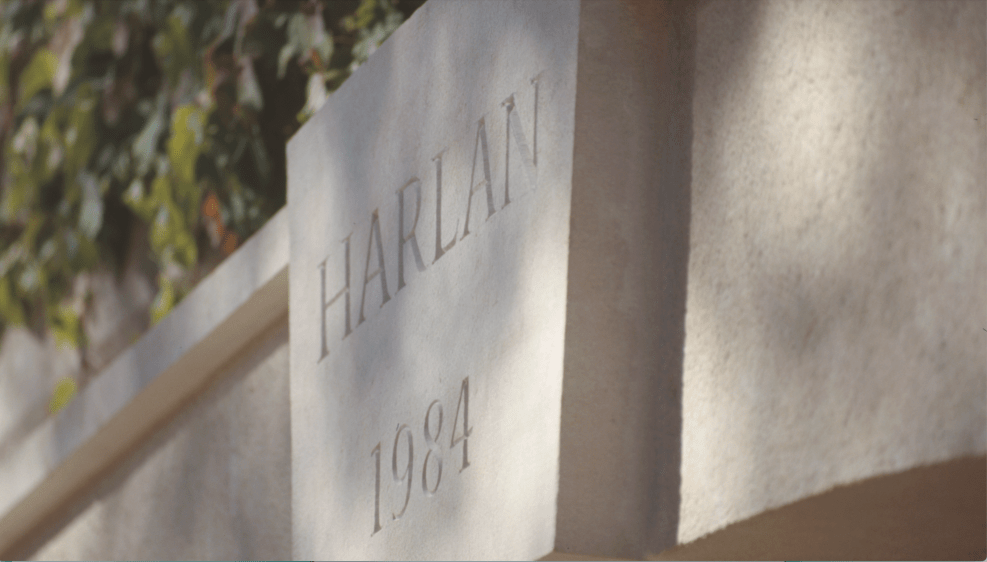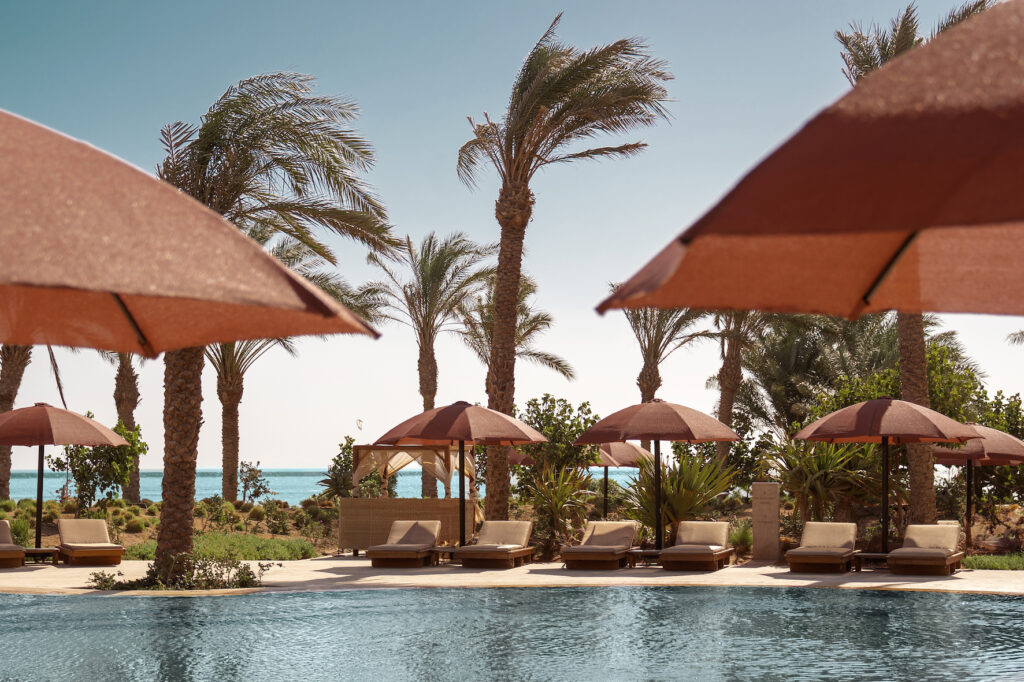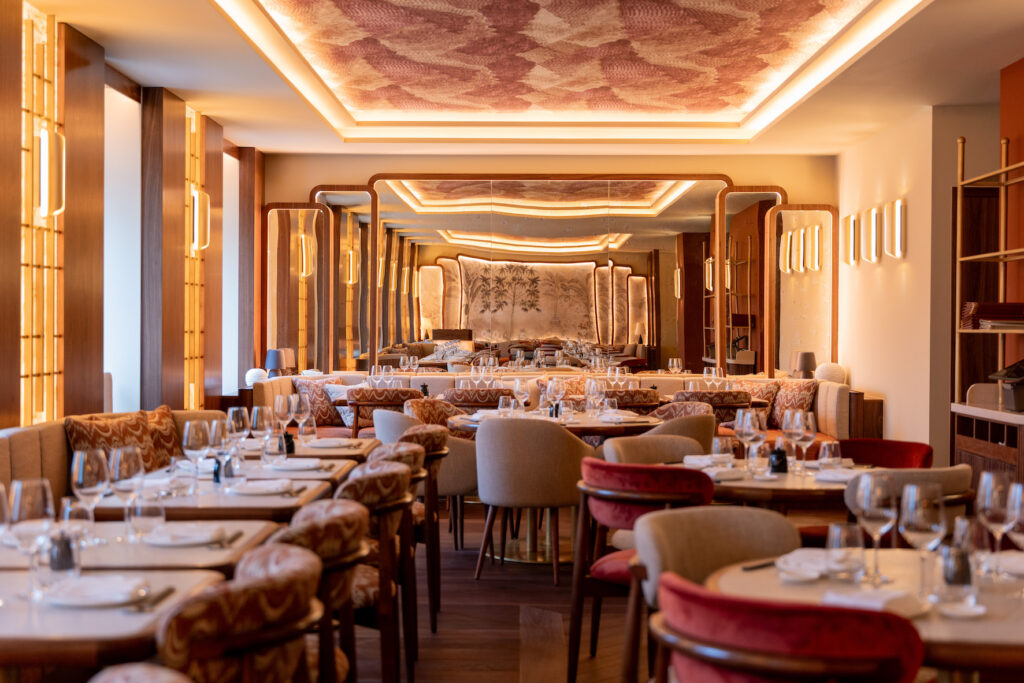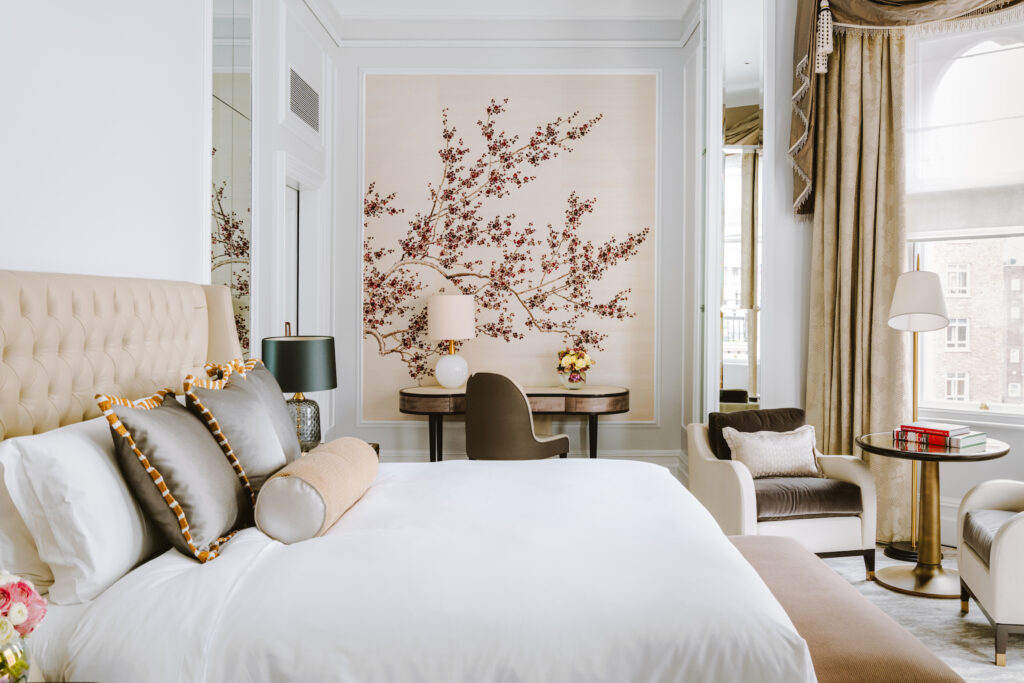Lewis Chester DipWSET, founder of the Golden Vines® Awards*, talks to the man who took over an American winemaking icon.
“The craziest thing I have ever done was to join the family business,” Will Harlan laughs as we taste a fine bottle of 1993 Harlan Estate. The son of legendary H. William Harlan (known as Bill), the founder of Napa Valley’s leading estate, 36-year-old Will has some very big boots to fill. Will is looking forward to welcoming his first child with his Italian-American wife, Gigi Dalla Gasperina. One wonders whether their offspring might well end up saying the same thing in 30 years from now if they decide to take up the mantle from their father.
“A lot of my time is spent thinking through, and then taking calculated risks while planning very long-term strategies for each of the three estates that I have been responsible for since 2020: Harlan Estate, BOND and Promontory,” he says. “I have had to rewire my brain, as well as my sense of sanity, to try to envision how things will be in 10, 20, 50 and 100 years’ time. Our mission is very long-term, with the objective of ensuring the family continues the stewardship of our estates over many generations.”

Will Harlan
Will grew up in St. Helena, a small town in Napa Valley, before majoring in Philosophy at Duke University. “My wine education was informal, and initially I had no particular interest in being involved with the family business,” Will explains. “After graduation, I returned to the Bay Area, starting a small consumer-facing company in the technology arena.” However, the wine bug happened to take hold of him almost by chance. As he was building his technology start-up, he’d spend time back in Napa with friends who were interested in tasting wines. He decided to bottle a wine made from the young vines not yet ready for inclusion in Harlan Estate or BOND. “I started cutting my teeth, blending and bottling these young vine wines, and then tasting them with my friends, who took a liking to them. I suppose that gave me the ammunition to ask the family if I could try to make some of this wine available to a wider audience.”
The Mascot
The family eventually agreed, though they insisted on some tough preconditions. Will couldn’t use the Harlan name for the wine, nor the estate’s incredible list of private clients, nor any of their existing distribution networks. If Will wanted to undertake an entrepreneurial venture in the wine world, he was on his own, even down to having to bottle and label the original vintage by hand himself. Rather than a deterrent, this fanned the entrepreneurial flame burning in Will. The Mascot was born, with the first commercial bottling in 2008. Today, The Mascot has its own full-time team and releases around 8,000 cases per year with a release price of $180 (around £144) per bottle.

Boris Zharkov
Promontory
After reigniting his interest in the wine business through The Mascot, he was then thrown into the deep end to manage a new project, Promontory. Will’s father, Bill, had spotted a wonderful piece of land 30 years earlier, around the time he was searching for the land that would become Harlan Estate. The vineyard, located just to the south and hidden from view, was an exciting terroir, but unfortunately it wasn’t originally for sale. But in 2008, the Harlan family was finally able to acquire the land.
It was this opportunity that convinced Will to join the family business full-time, as it would, in his mind, provide him the chance to establish a vision of his own. Promontory—a name that evokes the pioneering spirit of a bygone era in American history—“was a blank page, and I wanted it to represent a new model: neither New World, nor Old World in scope.” Napa Valley’s soils are usually either volcanic or sedimentary in nature, but Promontory happens to be on a sliver of metamorphic rock which, according to Will, “brings structure to the wines, but at the same time a feeling of weightlessness – linear and mineral”. The wine is essentially a monovarietal, Cabernet Sauvignon, with 80 acres under vine producing around 3,000 cases per annum with a release price of $1,000 (just over £800) per bottle.

Promontory
Harlan Estate: A “First Growth” of California
Bill Harlan had been in the real estate business when, in the early 1980s, he followed through on a lifelong dream to establish a winegrowing estate, and modelled the endeavour on the Bordeaux Left-Bank First Growths. In 1984, his vision for creating a “First Growth” of California began with the purchase of a 240-acre tract of land—33 acres of which are under vine—on east-facing volcanic soils situated on the western side of Oakville in Napa Valley.
Bill’s vision was extremely ambitious: “My dad wanted to build something that would be in the family for generations, and which could produce wines that might someday be considered among the fine wines of the world,” Will effuses with pride. “He planted Cabernet Sauvignon, Cabernet Franc, a small parcel of Merlot and a very small parcel of Petit Verdot. He built an incredible team around him, including Don Weaver as Founding Director who is still very present and influential at Harlan Estate.”
Bill Harlan’s vision became a reality. Producing less than 3,000 cases annually at a release price of $1,700 (around £1,350) per bottle, the 2023 Liv-Ex Classification (produced every other year and inspired by the 1855 Bordeaux Classification to determine a hierarchy of the leading global fine wine estates based upon secondary market prices) places Harlan Estate as the only non-French fine wine label in the top ten (10th place). Screaming Eagle, also from Napa Valley, is the next highest-placed Californian wine in 23rd place.

The Harlan Estate’s tank room
BOND
The third winegrowing endeavour under family ownership is BOND. Unlike Harlan Estate and Promontory, BOND is a partnership between the Harlan family and five, very small and diversely located vineyards owned by other families. The Harlan family are responsible for the viticulture and viniculture.
The first vintage took place in 1999 using grapes from two of those vineyards. Today, they farm a total of 25 acres on five plots, each having its own unique soil composition and facet of Napa Valley. BOND produces around 500 cases annually of each of the five wines, with a release price of $850 (about £680) per bottle. “Whereas the philosophy behind Harlan Estate is very much the Bordeaux model, BOND is in the vein of Burgundy with a focus on the five individual and distinct crus,” Will explains. “The name ‘BOND’, symbolises the trust and friendship between the owners of the five vineyards and our family, as well as the matriarchal family name of my father’s mother.”

BOND Boris Zharkov
Will Takes Charge
Although Will took over the stewardship of the family’s wine holdings in 2020, his father remains the Chairman and Founder, and the two—along with his sister, Amanda—remain closely united on their long-term vision. “My father and I are aligned one thousand percent on where we want to go and what we feel the potential is, with regards to deciphering the language of the land and translating that into the wine. Still, we occasionally disagree on how to get there”. When I tried to understand what differences of approach Will might be referring to, he told me: “I mean, we were born nearly half a century apart. He draws on his past decades of experience to guide his thinking, whereas I’m more enmeshed in the workings of the world today. The challenge is how to bring these two perspectives together to make the best long-term decisions. I’m sure we’re not the only multigenerational family business facing this particular challenge.”
Evolution not Revolution
One of their shared beliefs is in evolution, rather than revolution, in both the vineyard and winemaking philosophy of Harlan Estate. “We’re coming up to our 40th anniversary next year,” says Will. “Our understanding of the vineyard, the vines and the soils have improved greatly over time. With Cory Empting, our Managing Director of Winegrowing, we have dialled back on many of the inputs at Harlan Estate.
“For instance, the vineyard is now almost entirely dry farmed [as in no irrigation], the harvest date has moved forward as we are reaching phenolic ripeness earlier in the season, extraction is gentler, and therefore we have removed the layers obscuring the essence of the wine.” The result is wine that is different from those which many Francophiles associate with Napa Valley. There can be a profound elegance and refinement, especially in recent vintages.

Cory Empting Boris Zharkov
Dynastic Succession Planning
Succession planning is more straightforward for Americans than their French counterparts, who must contend with the legacy of Napoleonic laws. The family has put in place a multi-generational trust structure to ensure tax efficiency on death, smooth transfer of control, a set of rules regarding who can join the family business (qualifications, capability, and so forth) and an ironclad determination that the business will not be sold or broken-up. “My job is clear: I must ensure that I continue to plan for long-term family ownership and control of the business, while prioritising the potential of each of our winegrowing estates,” as Will puts it.
A Man of Extremes
Whereas Bill Harlan is known for being sociable, with a big personality and an even bigger rolodex of friends and contacts in the wine world, Will readily admits that he’s a little more introspective. “My father is known and loved by many in our industry,” he says. “He’s a great raconteur and is very outgoing. I probably have a different personality on the whole. On the one hand, I resonate pretty naturally with the Stoics, less focused on material things, and a bit of a dreamer. On the other hand, I enjoy travelling the world, especially regions that aren’t traditionally hunting grounds for Napa wines, while immersed in more Epicurean pursuits.”

The undulating topography of the Harlan vineyards
Indeed, Will is looking forward to presenting the 1995 Harlan Estate from the family’s library reserves alongside world class French wines at this year’s 2023 Golden Vines® Awards in Paris (13-15 October), the annual bash that has become known as the ‘Oscars of Fine Wine’. Will pauses for a moment when I ask him to explain the dichotomy, responding: “I’d say that I am quite firmly planted at each end of the Stoic/Epicurean scale.”
In keeping with his personality, I ask Will to choose his top three vintages of Harlan Estate for us to taste together—and he couldn’t have chosen three more different wines if he had tried.
1993 Harlan Estate

An early expression of Harlan Estate, this wine was made from seven-year-old vines. A ringer for a high-quality expression of aged Left-Bank Bordeaux, the nose was complex with floral petal notes, tobacco, chocolate, sweet spices, dark fruits and liquorice. In the mouth, the wine is still full of fruit—perhaps a tell-tale sign of its place of origin—with a good amount of fresh acidity and a cool menthol, eucalyptus taste on the long finish. Delicious.
“I chose the 1993 vintage,” explains Will, “because it was from a vintage many overlooked. It’s not a blockbuster Napa vintage. It’s still so fresh and even a little tight on the palate. I consider this wine one of the best examples of the early days of Harlan Estate, even though people wouldn’t expect it to be. I think it has a long life ahead of it.”
2001 Harlan Estate

With my European palate, the 2001 Harlan Estate is screaming California at me. A big, fruity wine, its coffee aroma on the nose is quite overwhelming. With some time in the glass, notes of dark chocolate, clove, cigar box, tobacco and menthol come to the fore. In the mid-palate, the wine is weighty, alcoholic and the finish quite sweet. A classic example of the style that Napa has been famous for during the past several decades.
“This is a quintessential example of Harlan Estate from that period and is showing extremely well today,” Will said as he explained his choice. “I love the secondary notes on the wine and the streak of acidity that is highlighting tiny facets of the wine today. I am very proud of our 2001 vintage.”
2019 Harlan Estate

This is the wine that really showcases the evolution of the vines and the “dialling back of the inputs” that Will has earlier outlined. Dark ink in colour, the nose is still quite primary, but exhibits black fruits, licorice and a eucalyptus note—found in all three wines—that Wills puts down to the bay laurel growing around the vineyard. In the palate, the tannins are remarkably soft, and there are no obvious oaky notes. The wine is very fine, almost European in character, and defined by fresh acidity which gives it an attractive lift in the mid-palate, and a savoury long finish. This is certainly the best young Harlan I have tasted.
“I choose 2019 as it encapsulates our evolution in philosophy, and understanding of the estates’ vines which are now approaching forty years of age,” explains Will. “2019 was a monumental vintage and the wine has a quiet strength that should age for decades without any discernible peak.”
Will Harlan’s Desert Island Choices
Book: Candide by Voltaire (or maybe Neuromancer by William Gibson)
Luxury Item: A great set of tools
Film / TV Show: Arrested Development (a comedy about a dysfunctional family who loses everything)
Band / Musician: Dream Theater (progressive metal band)
What would you do on the Desert Island: Explore
Craziest Thing You’ve Ever Done: Join the family business
Craziest Thing You Want to Do: Find some land in the desert and build large, soaring concrete structures—an almost sculptural garden somewhere between the Brutalist and Surrealist schools of architecture. Maybe something to consider for Marfa, Texas
Top Bucket-List Item: To have a garage or workshop, learn welding and metalwork, and work on cars and motorbikes
Lewis Chester DipWSET is a London-based wine collector, member of the Académie du Champagne and Chevaliers du Tastevin, co-founder of Liquid Icons and, along with Sasha Lushnikov, the founder of the Golden Vines® Awards. He is also Honorary President and Head of Fundraising at the Gérard Basset Foundation, which funds diversity & inclusivity education programmes globally in the wine, spirits & hospitality sectors.
The Golden Vines® 2023, recognising the world’s best fine wine estates as voted by hundreds of fine wine professionals, will take place in Paris between 13-15 October 2023. Please register your interest for tickets here.
* Robb Report is the Official Media Partner of the Golden Vines® and sponsor of the Golden Vines® World’s Best Fine Wine Producer Award.






